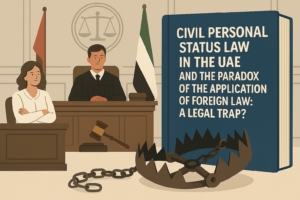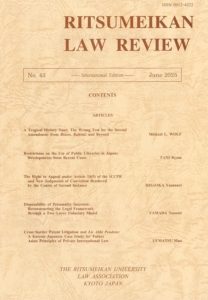Views
Civil Personal Status Law in the UAE and the Paradox of the Application of Foreign Law: A Legal Trap?

I. Introduction (*)
(*) For the sake of simplicity, reference will be made only to Federal Decree-Law No. 41/2022 of 2 October 2022 on Civil Personal Status. The Emirate of Abu Dhabi has enacted a separate law that addresses similar matters at the local level. For a comparison of the various applicable legal frameworks in family law in the UAE, see Béligh Elbalti, “The Personal Status Regimes in the UAE — What’s New and What Are the Implications for Private International Law? A Brief Critical Appraisal”.
There is no doubt that the introduction of the Civil Personal Status Law (CPSL) in the United Arab Emirates marks a significant turning point in the region’s legal landscape, particularly in areas traditionally governed by religious norms. The CPSL refers to the special law adopted at the federal level, which allows family law disputes involving non-Muslims (both foreigners and UAE citizens) to be resolved under a legal framework, that is intended to be modern, flexible, based on “rules of justice and fairness” and “the best international practices from comparative legal systems” (cf. article 19 of the Cabinet Resolution Concerning the Executive Regulation of Federal Decree-Law on the Civil Personal Status). However, the incorporation of the CPSL into the existing legal frameworks in the UAE has raised several issues. These include, among others, the articulation of the CPSL with the other applicable legal frameworks, and more importantly, the extent to which parties may opt out of this “modern” regime in favor of applying their own national laws (for a general overview, see Elbalti, op. cit.). Read more
Report on the ABLI/HCCH 4th Joint Webinar on “Cross-Border Commercial Dispute Resolution – Electronic Service of Documents and Remote Taking of Evidence“
by Achim Czubaiko-Güntgen, Research Fellow („Wissenschaftlicher Mitarbeiter“) and PhD Candidate, supported by the German Scholarship Foundation, Institute for German and International Civil Procedural Law, University of Bonn.
With the fourth instalment in their ongoing webinar series on “Cross-Border Commercial Dispute Resolution”, the Asian Business Law Institute (ABLI) and the Hague Conference on Private International Law (HCCH) returned to the topic of “Electronic Service of Documents and Remote Taking of Evidence”. Contrary to the first webinar in 2021, this session focussed not solely on the HCCH 1970 Evidence but equally on the HCCH 1965 Service Convention. Having finally overcome the immediate constraints of the Covid-19 pandemic, this time the renowned speakers were able to elaborate more on the long-term development and visions in the practice of the two legal instruments with regard to their respective areas of law.
The Nigerian Court of Appeal Upholds South African Choice of Court and Choice of Law Agreement
Case Citation:
Sqimnga (Nig.) Ltd v. Systems Applications Products (Nig.) Ltd [2025] 2 NWLR 423 (Court of Appeal, Lagos Division, Nigeria)
The dispute in this case arose between two Nigerian companies, Sqimnga Nigeria Ltd (the appellant) and Systems Applications Products Nigeria Ltd (the respondent). Both parties had entered into a Master Service Agreement in Nigeria, relating specifically to software solutions. A critical provision of this agreement stipulated that the laws of South Africa would govern any disputes, and further, that South African courts would possess exclusive jurisdiction to hear any matters arising from the agreement.
When a disagreement emerged between the parties, Sqimnga Nigeria Ltd initiated legal proceedings at the Lagos State High Court. The respondent immediately contested the jurisdiction of the Nigerian court, relying on the contractual clause mandating the use of South African law and courts. Read more
News
UEMATSU on Cross-border Patent Litigation and Lis Alibi Pendens: A Korean–Japanese Case Study for Future Asian Principles of Private International Law

The latest issue of the Ritsumeikan Law Review (No. 43, 2025), a law review in English published by the Ritsumeikan University Law Association since 1986, features a study by Professor Mao UEMATSU (School of Law, Ritsumeikan University) entitled Cross-border Patent Litigation and Lis Alibi Pendens: A Korean–Japanese Case Study for Future Asian Principles of Private International Law.
The article examines a series of patent litigation cases in Korea and Japan, analyzing them to “illustrate the complexity of cross-border patent litigation.” It further argues that, even after reforms to procedural laws in both Korea and Japan, structurally similar cross-border conflicts remain unresolved. The paper concludes with preliminary reflections on possible improvements in legal coordination within Asia.
By introducing case law from both jurisdictions and sharing information on recent legal developments in the region, the study provides valuable material for comparative research and contributes to a better understanding of the dynamics of Asian private international law.
The paper is freely available at the Ritsumeikan Law Review online version here.
Praxis des Internationalen Privat- und Verfahrensrechts (IPRax) 5/2025: Abstracts
The latest issue of the „Praxis des Internationalen Privat- und Verfahrensrechts“ (IPRax) features the following articles:
Call for papers: 2025 NGPIL Conflict of Laws’ Essay Prize
Originally posted on NGPIL blog on 26 August 2025
The Nigeria Group on Private International Law invites submissions for the annual NGPIL Conflict of Laws’ Competition. The winner will be awarded for the best essay on any aspect of Nigerian conflict of laws. Entries will be accepted from the following: an undergraduate and/or postgraduate scholar studying in Nigeria, or any Nigerian lawyer five years call or below practising and residing in Nigeria. The essay should be unpublished at the time of submission. Submitted essays should be in the English language. Submitted essays should also be within five to eight thousand words. Competitors may be citizens of any nation, age or gender but must be an undergraduate and/or postgraduate scholar studying in Nigeria, or any lawyer below five years post-call experience practising and residing in Nigeria.
The first prize is 200,000 Naira (NGN), and the winner of the competition will be encouraged to publish the paper in any high-quality peer reviewed journal on private international law (conflict of laws). The second prize is 120,000 Naira (NGN), and third prize is 80,000 Naira (NGN). The prize is sponsored by and will be awarded by NGPIL.
Submissions to the Prize Committee must be received no later than 31 October 2025. Entries should be submitted by email in Word or pdf format. The winner will be announced no later than 2 months after the deadline. Decisions of the NGPIL on the winning essay and on any conditions relating to this prize are final. Submissions and any queries should be addressed by email to ngpilaw@gmail.com. All submissions will be acknowledged by e-mail.
Previous Winners
Peace George (Winner for the 2023/2024 session)
Oluwabusola Fagbemi (Winner for the 2022/2023 session)
Solomon Adegboyo (Winner for the 2021/2022 session)



